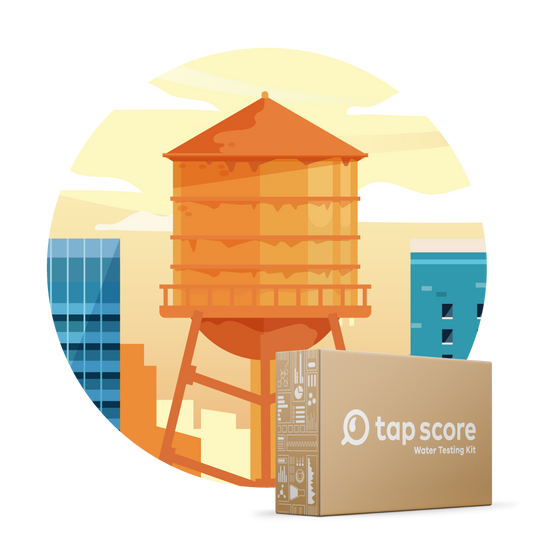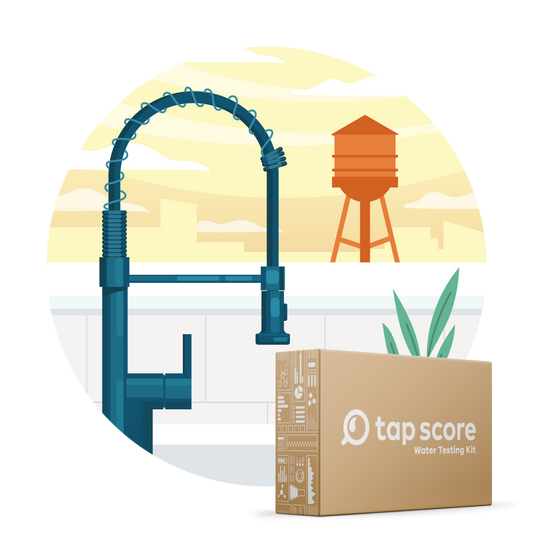
Quick Guide to Certified Water Filters for Lead
Our blog is written by real experts— not AI. Each guide is carefully reviewed and updated based on the latest research. Plus, with no affiliate links, you can count on unbiased insights you can trust.
Figuring out which water filters are certified to reduce lead can be difficult. Because lead is such a toxic drinking water contaminant, you want to be sure your treatment system is properly tested and verified to get the lead out.
We’ve done the legwork for you. This affiliate-free guide contains a comprehensive list of filters certified to NSF/ANSI standards for the reduction of lead and why certification is so important. These are not recommendations or endorsements, simply a listing, as requested by our curious customers.
Table of Contents:
- What Are the Relevant Standards for Lead Reduction?
- Water Filters Certified for Lead Reduction
- Which System Is Right for Me?
- How Do I Know if Lead Is In My Water?
- What’s the Takeaway?
Which NSF/ANSI Standards Are Relevant for Lead Reduction in Drinking Water?
Each NSF/ANSI standard addresses a specific group of contaminants and can be conferred on an individual contaminant-basis, meaning that a product may be certified for reduction of one contaminant under a particular standard but not ALL contaminants that standard covers. NSF/ANSI standards 53 and 58 can both be used to certify products for the reduction of lead, among a select group of other compounds.
NSF/ANSI 53
Certifies water treatment products for the reduction of contaminants that could cause adverse health effects, e.g. lead, chromium, VOCs, and more. A chosen product must be certified to this standard for each contaminant individually. For example, a product can be certified to NSF/ANSI standard 53 for arsenic, but not for lead.
NSF/ANSI 58
Sets minimum requirements for point-of-use (POU) reverse osmosis (RO) systems in particular. Again, this standard covers contaminants such as lead, arsenic, VOCs, and more, but sets specific requirements the system needs to meet for each contaminant.
Does NSF/ANSI/CA 372 Apply to Lead Reduction?
This standard does not pertain to the reduction of lead in water. Instead, it outlines the general requirements relating to the lead content of drinking water system components such as solders and fluxes, faucets, water filters, water meters, coating, valves, pipes, etc. Certification to this standard ensures that these components do not exceed a maximum weighted lead content requirement, it gives no other information about the functioning of the component.
Why Do Certifications Matter?
Federal agencies that regulate drinking water (i.e., the EPA for tap water and FDA for bottled water) do not regulate treatment devices. Certification to NSF/ANSI standards helps to provide unbiased information to consumers about which products will be effective for their water treatment needs. Some of the most popular NSF/ANSI standards address:
- Materials safety
- Structural integrity
- Specific contaminant reduction claims
What If A Filter Is Not Certified?
Because certifications are voluntary (and can be quite costly), firms can choose to skip the process altogether and still make a product that works just fine. On the other hand, a company may choose to skip certification because their product doesn’t work as well as they claim.
NSF/ANSI Certifications Explained
Water Filters Certified for Lead Reduction
This is an incomplete list of products (including the brand, product name, SKU and certifying body) certified for the reduction of lead in drinking water.

Countertop and Faucet Filters Certified to NSF/ANSI 53 for Lead Reduction
-
Brita Elite/Longlast+
(OB06) NSF/WQA
-
Brita Elite Advanced Water Filter
(FR200) WQA
-
Brita Hub Filter
(CT01) WQA
-
PUR PLUS Lead-Reducing Pitcher Filter
(PPF951K) WQA
-
PUR Faucet Filter
(RF3375) NSF/WQA
-
ZeroWater 5-Stage Filter
(ZR-017) IAPMO
-
Aquasana Clean Water Machine
(AQ-CWM2-R) WQA
-
Lifestraw Home Replacement Filte
(LSH7SPC301) NSF
-
Carbon Block Technology Counter-Top Connected to Sink Faucet Filter
(System: MPADC / Cartridge:CBTAD) NSF
-
Multipure Aquadome Filter
(System: MPAD / Cartridge: CB6AD) NSF
-
Pelican Water Systems Countertop Drinking System
(PDF-RF) NSF
Note: Both filter cartridges and the units they fit into (pitchers, countertop systems, etc) are often referred to as “filters.” A filter cartridge is the unit that actually filters the water and may often fit into multiple models of pitchers and countertop systems.
Under-sink Systems Certified to NSF/ANSI 53 for Lead Reduction
Under-sink systems typically have multiple stages composed of different filters and/or other treatment technologies (like UV disinfection).
-
Hydroviv Drinking Water System Replacement Cartridge
(14cZIP) NSF
-
Doulton Biotect Ultra Replacement Cartridge
(W9123050) NSF
Reverse Osmosis Systems Certified to NSF/ANSI 58 for Lead Reduction
This standard is specific to reverse osmosis systems and includes some additional tested parameters such as recovery rating and TDS reduction. Reverse osmosis filters can be certified to other standards instead, but other technologies may not be certified to NSF/ANSI 58.
Products below are listed with information as follows: (Model Number/Replacement Element SKU)
-
AquaTru Carafe
(System: AT100/ Cartridge: 10AT100RF01) IAPMO
-
Brondell H2O+ Capella
(System: RC250/ Cartridge: RF-50) WQA
-
APEC Ultimate 5-Stage 90 GPD High Output RO Water Systems for Drinking Water
(System: RO-90/ [Cartridges: 1-SED10; 23-CAB10; MEM-90; 5-TCR]) WQA
Is “Tested to” the Same as “Certified for”?
No. When a product claims that it has been “tested to NSF standards” without receiving any actual certification, that means the product was not tested to the standard by one of the certifying bodies (NSF, WQA or IAPMO) and perhaps that parts of the standards were not actually met.
We’ve gone into more detail parsing out the variations of certification claims on products in our Red Flags Guide to Trusting Water Filter Reviews.
Which System Is Right for Me?
That answer always depends on a combination of your preferences and the specifics of what’s actually in your water’s unique contaminant profile. There are many factors to consider when choosing a water treatment system. These include:
- Effectiveness against contaminants of concern
- Monthly operating costs
- Ease-of-use
- Filtration rate
- Replacement/maintenance requirements
Not everyone has lead in their water so you’ll want to test to find out. You’ll also learn if there’s anything else you should be aware of. If your water test shows you do have lead in your water, you might want to learn how treatment technologies differ from one another.
How Do I Know If I Have Lead in My Water?
Because lead cannot be seen, smelled, or tasted, the only way to find out for sure is to have your water tested by a certified laboratory. Test strips cannot be trusted to present an accurate—or adequate—picture of lead contamination.
Tap Score’s Advanced City Test kit tests for over lead in drinking water in addition to 100 other analytes—including other heavy metals and water chemistry parameters that are key to selecting the right treatment system:
Our Lead and Copper Water Test zeroes in on lead and copper for targeted testing:
Tap Score’s water quality reports also make unbiased treatment recommendations that are easy to understand.
What’s the Takeaway?
- NSF, WQA and IAPMO can certify water treatment devices to standards that prove they adequately reduce lead in drinking water. The relevant standards for lead reduction include NSF/ANSI 53 and NSF/ANSI 58.
- Each NSF/ANSI standard can cover many contaminants, make sure the product you are looking at is certified to reduce the specific contaminant of concern.
- Because NSF/ANSI certifications are voluntary, firms can choose to skip the process altogether and still make a product that works just fine. Be aware, however, that when a product claims that it has been “tested to NSF standards” without receiving any actual certification, parts of the standards could have been omitted.
- The only way to find out for sure if your water contains lead is to have your water tested by a certified laboratory as lead cannot be seen, smelled or tasted. Once you’ve tested your water, you can explore the treatment options that are right for you.
Read our other certified filter quick guides:
Certified Water Filters for PFAS
Certified Water Filters for Fluoride
Quick Guide to Faucet Filters






